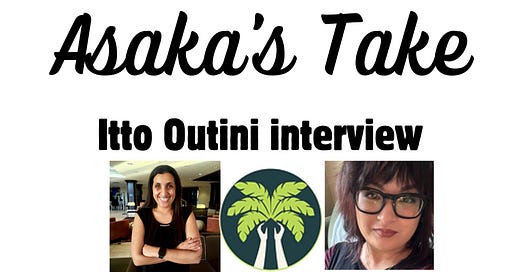Asaka's Take: Itto Outini, Blind Journalist (The Datekeepers)
On Itto's background and her writing process
Mark Simon here. We’re offering up these comprehensive episode summaries both to entice people to listen to The Journalism Salute and to offer an alternative for those who don’t have time. Here is Asaka Park’s latest edition.
Itto Outini is a freelance journalist, a motivational speaker, and a co-founder of the website, The Datekeepers.
Outini is a first-generation immigrant from Morocco, and her story is quite remarkable. From an early age, she dealt with abuse, neglect, and poverty.
Outini learned to read and write at 17, right after being blinded and kicked out by her family, and headed to college in just six years. Today, she has a master’s degree and can speak five languages.
She has founded Fulbrighters with Disabilities and has worked for the United Nations. She is currently working on her memoir, Blindness is the Light of My Life.
1. Outini didn’t have a “typical” childhood.
“I was born and raised in the middle of nowhere, with no access to technology, running water, electricity,” Outini tells Mark.
“My story is quite unusual even to me, a person who has lived there. There are a lot of things that didn't happen to me until very late in my life, including education.”
Orphaned at a young age, Outini spent her childhood being passed around from one household to another, living in the shadows of extended family who didn’t want the responsibility of raising her. She couldn’t even go to school.
But she found solace in the art of storytelling.
“If there was no one to tell story to, I told stories to animals and trees,” she says, noting that her tribe, the Berbers, or Amanigh, are known for their abilities for oral storytelling.
“So how would someone think if they hear that I am now a journalist? We had no access to podcasts, magazines, newspapers, televisions, nothing. But we had one thing. It was oral storytelling.”
— Itto Outini on The Journalism Salute
At 17, Outini was blinded by a family member. When she was in the hospital, the rest of her family abandoned her.
“Believe it or not, that was the first time I started school,” she said.
2. Outini didn’t know how to read, count, or spell until she was 17.
“One of those challenges was that I couldn't start from the first grade, like you cannot have a 17 year old woman in the first grade. That just doesn't work.”
Her only chance for an education? A sixth grade test.
“If I passed, I am lucky; I'll go straight to the seventh grade. If I didn't pass; I would just stay uneducated.”
“When I went to school, I knew that was the only opportunity for me to change my life.”
— Itto Outini for The Journalism Salute
Despite these setbacks, Outini managed to graduate high school after six years.
Then an American couple took her under her wings: “They said, ‘this woman has a lot of potential and she's hardworking and she wants to learn, and why not help her?’”
They got her to the American Language Center, where she learned English and was connected to a local university where she got an associate’s degree in English Literature. She then headed to Mohammed V University, a top university in Morocco, to study Applied Linguistics, and got a Fulbright scholarship to University of Arkansas.
“I was very determined and I had dreams and goals and one of those dreams is to work for the UN, the other to go to the US and to become a journalist, and all of those dreams have come true,” she tells Mark.
Outini has written about the unique challenges of being an immigrant, such as dealing with remittance
(It’s a familiar concept that you might not know has a name — listen to the podcast to learn more).
3. It’s important to not make assumptions about people who are blind (or have any disability for that matter).
Outini typically uses a screen reader. Sometimes, this requires more concentration. “If I, for example, skip a word or a sentence or a line, then of course the meaning might change, or I might get some details wrong, so I have to focus using my listening skills, and I have had to work on that,” she explains.
When Outini was in school, she didn’t have assistive technology, but was well-accommodated by her “supportive and patient” community. Her French teacher read aloud things to her. Her science teacher bought her a portable radio and recorded stories. Sometimes, all it takes is some consideration.
Outini tells Mark that she has “no problem” accessing any forms of stories —“As long as I can read the language that the story is produced in.”
“Different people have different preferences, whether someone blind or deaf or able bodied or from different cultures, different people have different ways of speaking, doing things.”
— Itto Ouniti on The Journalism Salute
As a journalist, Outini has had the opportunity to speak to those with backgrounds similar and different from hers. In interviewing other blind people who have grown up in developing nations, it is language, not disability, she has to think about.
For example, when she wrote a profile about Osama Shamallakh, a Palestinian activist helping help disabled people during the crisis, she recalls having to translate the conversation from his Palestinian dialect to an Arabic dialect to standard Arabic and then to English.
Outini says she welcomes talking to people who are different than her. She says that she hopes to “travel the world and actually — not see, but like — feel places where my subjects have been to.”
“I use the word ‘tasted’… I tasted the yumminess, the power of education, I love reading.”
— Itto Outini on The Journalism Salute
4. Outini likes to take her time writing articles.
Outini's articles go through anywhere from three to nine drafts before reaching completion. Her profile of Shamallakh took her “a whole year.”
“I've been working on my memoir for 10 years, so it has taught me a lot of patience,” she tells Mark.
“The hardest part of being a journalist is that there's not enough time to write all the stories.”
“I don't sleep much. I am lucky,” she says. “I don't encourage people not to sleep; that’s not something I do. I actually had to read a book about why we sleep. And I found out that 5 percent of the world's population operate perfectly on like three or four hours of sleep. And I just happened to be one of those people.”
“I don't feel comfortable if I don't have a challenge, at least to me. One challenge a day”
— Itto Outini for The Journalism Salute
The longest article she wrote was about the late disability activist, Mark Bookman, whom she describes as “a friend, a mentor, and the most compassionate, passionate, and loving person I've ever met.” Outini fondly recalled interviewed him for three hours. She was still in the process of writing his profile when Bookman suddenly passed away.
“Both my husband and I have worked on it and it makes me proud because it's a way to make Mark's memory of life and make his work visible to people from all over the world,” she reflects.
5. She runs The Datekeepers, with her husband, Makiya.
“A lot of people reach out to me and say, are you a dating site for journalists? And I'm like, no, no, no, you, you got it wrong. We don't do that. Maybe someone should start that.” (Tune in to hear why it’s called the Datekeepers)
The Datekeepers is an online community that provides “support that not many places offer, like long term mentorship, editorial feedback, and guarantee to publish however many pieces that a writer is willing to put their time into, [as well as] long term mentorship and also access to writers and journalists from all over the world.”
Outini says she uses the lens of journalistic ethics, like “minimize harm but also seek the truth and report it,” in multimedia storytelling. Right now, she is thinking about ways to “bring as many journalists and non fiction writers together as a larger group.”
“I was a nobody right before I became the person I am today; I was invisible. And I want to help give people visibility and highlight their work and celebrate their accomplishment with our international audience.”
— Itto Outini on The Journalism Salute





